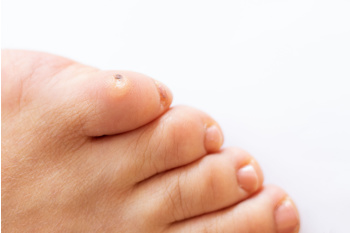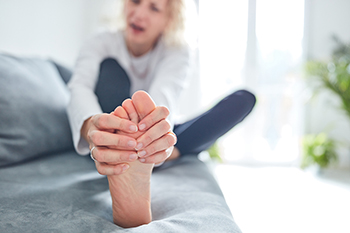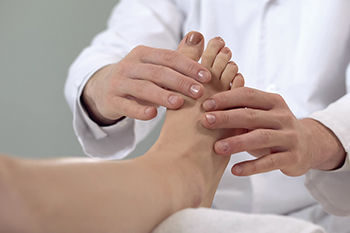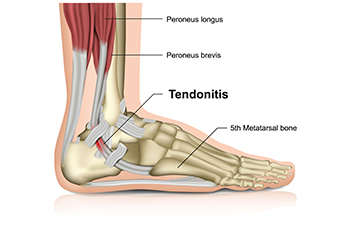Items filtered by date: September 2025
Treatment Options for Corns on the Feet

Corns develop on the feet when constant friction or pressure causes layers of skin to thicken on the tops of toes, between toes, or on bony areas. Corns can become painful, making it difficult to walk or wear shoes comfortably. In some cases a corn may become infected if not properly managed. A podiatrist can determine whether the corn is hard or soft in order to provide the best path to relieve discomfort. Treatment may include trimming away hardened skin in a sterile setting to reduce pressure, recommending shoe modifications to decrease rubbing, or prescribing custom orthotics to improve foot alignment and lower stress on affected areas. If a bone deformity, such as a hammertoe, continues to create pressure, surgery may be considered to correct the underlying problem and prevent recurrence. Professional care is important, as attempting to trim corns at home can lead to further injury. If you have a painful corn on your foot, it is suggested that you make an appointment with a podiatrist for an exam, diagnosis, and safe treatment.
Corns can make walking very painful and should be treated immediately. If you have questions regarding your feet and ankles, contact Dr. Milliron of Eternal Sole Foot and Ankle. Our doctor will treat your foot and ankle needs.
Corns: What Are They? And How Do You Get Rid of Them?
Corns are thickened areas on the skin that can become painful. They are caused by excessive pressure and friction on the skin. Corns press into the deeper layers of the skin and are usually round in shape.
Ways to Prevent Corns
There are many ways to get rid of painful corns such as:
- Wearing properly fitting shoes that have been measured by a professional
- Wearing shoes that are not sharply pointed or have high heels
- Wearing only shoes that offer support
Treating Corns
Although most corns slowly disappear when the friction or pressure stops, this isn’t always the case. Consult with your podiatrist to determine the best treatment option for your case of corns.
If you have any questions, please feel free to contact our office located in Pace and Jay, FL . We offer the newest diagnostic and treatment technologies for all your foot care needs.
Foot Cramps and Their Causes

Foot cramps are sudden, involuntary muscle contractions that cause sharp pain and tightness in the feet. They can indicate underlying issues, such as dehydration, poor circulation, nerve problems, or muscle fatigue. Symptoms include intense pain, hardening of the muscle, and temporary difficulty in moving the foot. Risk factors include overexertion, prolonged standing, inadequate stretching, or wearing unsupportive shoes. Common causes may also involve electrolyte imbalances, medical conditions like diabetes, or certain medications. A podiatrist can help by identifying contributing factors, recommending lifestyle changes, prescribing orthotics, and suggesting stretching routines to reduce recurrence. If you have frequent or severe foot cramps, it is suggested that you consult a podiatrist who can determine the cause, and offer effective treatment and relief solutions,
Foot Pain
Foot pain can be extremely painful and debilitating. If you have a foot pain, consult with Dr. Milliron from Eternal Sole Foot and Ankle. Our doctor will assess your condition and provide you with quality foot and ankle treatment.
Causes
Foot pain is a very broad condition that could be caused by one or more ailments. The most common include:
- Bunions
- Hammertoes
- Plantar Fasciitis
- Bone Spurs
- Corns
- Tarsal Tunnel Syndrome
- Ingrown Toenails
- Arthritis (such as Gout, Rheumatoid, and Osteoarthritis)
- Flat Feet
- Injury (from stress fractures, broken toe, foot, ankle, Achilles tendon ruptures, and sprains)
- And more
Diagnosis
To figure out the cause of foot pain, podiatrists utilize several different methods. This can range from simple visual inspections and sensation tests to X-rays and MRI scans. Prior medical history, family medical history, and any recent physical traumatic events will all be taken into consideration for a proper diagnosis.
Treatment
Treatment depends upon the cause of the foot pain. Whether it is resting, staying off the foot, or having surgery; podiatrists have a number of treatment options available for foot pain.
If you have any questions, please feel free to contact our office located in Pace and Jay, FL . We offer the newest diagnostic and treatment technologies for all your foot care needs.
Struggling with wounds that just won’t heal?

Favor Foot Ankle Leg & Wound Care is proud to be New Jersey’s leader in advanced wound care. Our experienced team is dedicated to providing innovative and effective treatments for non-healing wounds - so you can start healing today!
See if advanced wound care is right for you - Request an appointment today!
The Work of a Podiatrist

A podiatrist is a medical specialist who focuses on the health of the feet and ankles. Their training prepares them to diagnose and treat a wide range of conditions, from everyday issues like ingrown toenails and calluses to more complex problems such as fractures, tendon injuries, and diabetic foot complications. Podiatrists also play a vital role in identifying circulation problems, nerve damage, and structural changes that may affect walking and balance. Treatments can include custom orthotics, wound care, and surgical procedures, when needed. Beyond addressing pain and injury, podiatrists work to prevent long-term complications by monitoring changes in the feet that might signal larger health concerns. This combination of medical knowledge and hands-on care allows patients to maintain mobility and independence. For concerns related to foot or ankle health, or if you are interested in pursuing podiatry as a career choice, it is suggested that you see a podiatrist.
If you are experiencing pain in the feet or ankles, don’t join the stubborn majority refusing treatment. Feel free to contact Dr. Milliron from Eternal Sole Foot and Ankle. Our doctor can provide the care you need to keep you pain-free and on your feet.
What Is a Podiatrist?
Someone would seek the care of a podiatrist if they have suffered a foot injury or have common foot ailments such as heal spurs, bunions, arch problems, deformities, ingrown toenails, corns, foot and ankle problems, etc.
Podiatric Treatment
A podiatrist will treat the problematic areas of the feet, ankle or lower leg by prescribing the following:
- Physical therapy
- Drugs
- Orthotic inserts or soles
- Surgery on lower extremity fractures
A common podiatric procedure a podiatrist will use is a scanner or force plate which will allow the podiatrist to know the designs of orthotics. Patients are then told to follow a series of tasks to complete the treatment. The computer will scan the foot a see which areas show weight distribution and pressure points. The podiatrist will read the analysis and then determine which treatment plans are available.
If you have any questions, please feel free to contact our office located in Pace and Jay, FL . We offer the newest diagnostic and treatment technologies for all your foot care needs.
Flip-Flops Versus Slides and What You Need to Know for Foot Health

Flip-flops are a popular choice for warm weather due to their ease of wear and variety of designs and colors. Compared to slides, flip-flops often provide less stability and support, which can make them more uncomfortable for prolonged use. While slides offer slightly better coverage and support, both types of footwear can contribute to foot problems when worn frequently. Common drawbacks of flip-flops include lack of proper arch support, minimal cushioning, and increased risk of blisters, heel pain, or plantar fasciitis. A podiatrist can evaluate your footwear habits, recommend supportive alternatives, and provide treatments to address foot pain or prevent long-term issues. If you are experiencing discomfort from wearing flip-flops or slides, or have developed foot pain, it is suggested that you consult a podiatrist who can treat various foot conditions, and guide you on similar and appropriate shoes to wear.
Flip-flops are not always the best choice of footwear. If you have any concerns about your feet or ankles, contact Dr. Milliron from Eternal Sole Foot and Ankle. Our doctor will assist you with all of your foot and ankle needs.
Flip-Flops and Feet
When the weather starts warming up, people enjoy wearing flip-flops. Flip-flops are comfortable, stylish, and easy to slip on and off; they're perfect for any summer beach goer. However, these shoes can cause harm to the feet.
How Can Flip-Flops Affect Me Long-Term?
- Ankle problems
- Hip problems
- Lower back problems
- Pain in the balls of the feet
- Problems with foot arches
- Changes in the way you walk
Are There Injuries Associated with Flip-Flops?
Yes. Since flip-flops are relatively weak and do not provide the same amount of support as sneakers, people who wear flip-flops regularly are more susceptible to injuries. On top of that, the open nature of the shoe makes your feet more prone to other problems, such as cuts and even infections. Common injuries and ailments include:
- Sprained ankles
- Blisters
- Infections
- Cuts and Scrapes
I like Wearing Flip-Flops. Are There Safe Alternatives?
When buying flip-flops, try to find ones that have sturdy soles and that are made of high-quality materials that will support for your feet. These flip-flops will cost more but will also last longer as a result.
If you have any questions, please feel free to contact our office located in Pace and Jay, FL . We offer the newest diagnostic and treatment technologies for all your foot care needs.
Common Achilles Tendon Injuries and How to Find Relief

The Achilles tendon is the strongest tendon in the body, connecting the calf muscles to the heel bone, yet it is prone to painful injuries. Achilles tendinopathy is a condition marked by stiffness, swelling, and discomfort along the tendon, often caused by overuse or repetitive stress. A sudden rupture, or break, occurs when the tendon tears, usually with sharp pain and difficulty walking or pushing off the foot. These injuries typically occur in the back of the ankle, just above the heel. A podiatrist can provide a thorough evaluation, advanced treatments, and guidance for safe recovery. If you are experiencing Achilles tendon pain or have sustained an injury, it is suggested that you consult this type of doctor who can accurately diagnose and effectively treat this condition.
Achilles tendon injuries need immediate attention to avoid future complications. If you have any concerns, contact Dr. Milliron of Eternal Sole Foot and Ankle. Our doctor can provide the care you need to keep you pain-free and on your feet.
What Is the Achilles Tendon?
The Achilles tendon is a tendon that connects the lower leg muscles and calf to the heel of the foot. It is the strongest tendon in the human body and is essential for making movement possible. Because this tendon is such an integral part of the body, any injuries to it can create immense difficulties and should immediately be presented to a doctor.
What Are the Symptoms of an Achilles Tendon Injury?
There are various types of injuries that can affect the Achilles tendon. The two most common injuries are Achilles tendinitis and ruptures of the tendon.
Achilles Tendinitis Symptoms
- Inflammation
- Dull to severe pain
- Increased blood flow to the tendon
- Thickening of the tendon
Rupture Symptoms
- Extreme pain and swelling in the foot
- Total immobility
Treatment and Prevention
Achilles tendon injuries are diagnosed by a thorough physical evaluation, which can include an MRI. Treatment involves rest, physical therapy, and in some cases, surgery. However, various preventative measures can be taken to avoid these injuries, such as:
- Thorough stretching of the tendon before and after exercise
- Strengthening exercises like calf raises, squats, leg curls, leg extensions, leg raises, lunges, and leg presses
If you have any questions please feel free to contact our office located in Pace and Jay, FL . We offer the newest diagnostic tools and technology to treat your foot and ankle needs.
